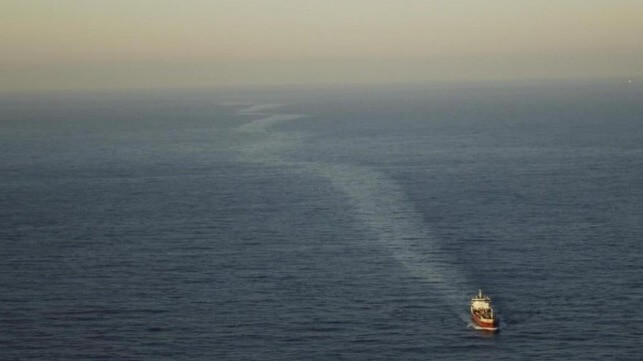Tanker Operator Claims Sheen Came From Legal Biofuel Discharge

When Spanish authorities spotted a tanker trailing a visible sheen in broad daylight, they may have thought that they had found an easy MARPOL charge. According to the operator, though, there was no need to hide the slick: the discharge was a mix of water and biodiesel, and it was perfectly legal.
On Tuesday, the Turkish-operated product tanker Lagertha was detained in the Spanish port of Tarragona on suspicion of discharging hydrocarbons. Spain's transport ministry said that satellite radar and aircraft overflights had detected a sheen extending out from the vessel's wake, large enough to cover an area of about five square miles. The ministry detained the vessel and requested payment of a bond of $100,000 in advance of administrative penalty proceedings.
The operator, Besiktas Shipping Group, confirmed that Lagertha had discharged water from tank washing operations while at sea. However, the company said, the discharge and the visible sheen were lawful. The ship had previously carried fatty acid methyl ester fuel (FAME, or first-generation biodiesel). FAME is a biological product, and MARPOL only prohibits untreated discharge of "oil or oily mixtures."
"Our vessel was at full compliance with MARPOL during washing and disposal of the tank washings into the sea," Besiktas told Reuters. "Any trace from this tank washing discharge operation does not mean a pollution."
The company noted that the ship passed its port state control inspection in Tarragona without any deficiencies, and it has already departed for its next commercial destination.
For its part, the Spanish transport ministry still plans to pursue penalties for "illegal unloading," it told Reuters.
MARPOL violations remain a significant compliance issue for the shipping industry, particularly in certain geographical regions. According to a widely-cited study published in Science last year, ocean oil slicks from all human and natural sources cover an area about twice the size of Turkey at any given time. The researchers estimated that shipping is responsible for about 20 percent of the total.
